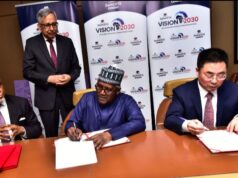
Experts have identified what they called “complicated web of officialdom” as being responsible for electricity failure in Nigeria.
This came against the backdrop of the popular belief among many Nigerians that power failure is caused by system instability.
During the panel discussion at the WorldStage Economic Summit 2023, with the theme: National Dialogue on Electricity which took place on November 16, Lagos, the experts insisted that outages are not only as a result of government negligence or lack of resources to generate it, but is also due to complicated web of officialdom.
At the summit, supported by Shell Nigeria, Nigerian Communications Commission (NCC), Nigeria LNG Limited (NLNG), Central Bank of Nigeria (CBN), Zenith Bank Plc, NNPC Limited and moderated by Professor Olufemi Saibu, Professor of Economics, University of Lagos, one of the panelists, Johnson Akinnawo who represented Dr. Nnamdi Nnemeka, the MD of Nigerian Bulk Electricity Trading PLC, said that the power sector is largely challenged by draught of investors.
This was even as Gabriel Idahosa, Deputy President of the Lagos Chamber of Commerce & Industry (LCCI) who represented the President, Dr Michael Olawale-Cole, said that the refusal by federal government to grant electricity distribution companies the right of transmission had compromised their advantage to make profit.
The representative of Dele Kelvin Oye, National President, Nigerian Association of Chambers of Commerce, Industries, Mines and Agriculture (NACCIMA), William said that electricity generating companies in the Nigeria are challenged by inadequate infrastructure to operate optimally and urged government to address the problems.
Earlier, Akinnawo had bemoaned the complexity in the entire chain of power generation, distribution and transmission by raising a concern that in spite of the large amount of money that had been pumped in by successive governments, electricity supply remains unreliable.
Responding to the question on how best to address the challenges of power generation, Akinnawo said it would require humongous investment considering the problem of gas supply for power generation.
“There is the problem of gas challenge because it’s more profitable to export gas than selling it locally to generate electricity.”
He differed with Idahosa’s position on states’ regulation of electricity as well as government ceding transmission to GenCos and DisCos as it did with generation and distribution.
Akinnawo argued that states were not financially endowed, a situation he said might create unintended unfavourable gap in electricity supply to respective public and eventually defeating the very essence of the policy of liberalization. He argued further that some states might be able to meet up with the financial capability needed to train and set up regulators.
He said that investors would only come into the sector if they know they could make money.
“So, the solution to the challenge of gas in electricity generation is sufficient exploitation as well as exploration of gas to meet domestic needs for assured investment bankability. Model of concessioning the grid must be made bankable to encourage investors,” Akinnawo recommended.
He warned however, that breaking up the grid had its advantages and disadvantages, explaining that if grid is broken down into smaller units, it would take a toll on the main or larger ones whenever problems occurred. But he emphasized that the federal government s yet to take decision about breaking the grid down to smaller units as being suggested by some sections of the Nigerian public.
Asked about the current high tariff on electricity and what are responsible for it, he explained that electricity as a product must be sold at profit and urged the public to understand that.
He added that there is regulation in investment network of electricity which had to be understood so as to know why and how tariffs were calculated. Though, he lamented that it was a vicious cycle of a sort, he expressed optimism that Nigerians will soon benefit from the multi-pronged government’s efforts at improving electricity.
He admitted that investment might not have yielded enough results in the past, and assured that with the coming of the 2023 Electricity Act, there’s now hope for state governments to take the advantage to improve electricity supply to their respective communities and make profit as well.
Idahosa said that the power sector had gone through series of reforms leading to federal government acceptance that it didn’t have the expertise to improve and privatize electricity.
He said that the country was generating about 14,000 mega watts of electricity but that due to all sorts of technicality and complex management, Nigerian public could not enjoy more that 4,000 to 5,000MW total output.
Idahosa also stated that generating, distributing and transmitting electricity are very technical processes which not a few countries had been able to run well.
He wondered why government is still holding to the transmission aspect of electricity after privatizing generation and distribution, saying however that the good thing so far is that with the 2023 Electricity Act states are now allowed to partake in all the three legs.
He canvassed that for the privatization to succeed and ensured seamless electricity supply, the gas sector needed to be improved since power generation requires gas supply.
He enlightened that the privatization would favour some states and stakeholders than others, depending on population, citing Lagos as an example of those favoured to attract investment .
Idahosa said ever a project is to be built through government and private ownership, the private investors do not need to provide all the capital required at once.
He said that GenCos and DisCos need transmission opportunity to survive but that they were yet to be given.
“So we are canvassing that transmission should be extended to companies generating and distributing electricity,” he stated.






